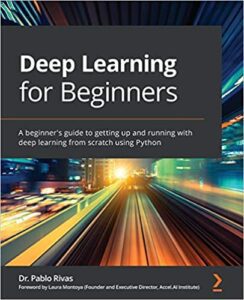Pablo Rivas is the author of Deep Learning for Beginners, we got the chance to sit down with him and find out more about his experience of writing with Packt.
Q: How long did it take you to write the book?
Pablo: It took a little over a year of hard work. I wrote the first chapter in May 2019, and the last chapter in August 2020.
Q: What kind of research did you do, and how long did you spend researching before beginning the book?
Pablo: I do research in the general areas of deep learning. I have recently devoted my time to the ethical and societal implications of deep learning algorithms. However, my main focus has been self-supervised algorithms, unsupervised algorithms, applications to computer vision, natural language processing, learning representation, and cryptography. I have been researching deep learning long before it was known as deep learning, for about 20 years; so it was easier to put my thoughts together and a coherent outline that would present well-known, well-established algorithms (and a few experimental ones). I would only research the status quo before starting every chapter.
Q: Did you face any challenges during the writing process? How did you overcome them?
Pablo: Yes, a lot happened. I proposed to finish the book around October, 2019; however, there were a number of new commitments I didn’t plan for at work and was writing triple as slow as I wanted to. By December, I was only half way through the book. Then, the pandemic hit us really hard in New York, and work got complicated one more time, we had to transition all of our teaching online, in a few days in the middle of the semester and I got stuck. My employment situation changed in the middle of all that. It became a problem with my Packt editor. The problem is that I was not communicating what was happening at work, and in my personal life, and how the pandemic affected us directly. However, once I explained everything to my team, they were very understanding and helped me move forward and bring this book to completion. Time management was the key to finish this on time. Thankful for my Pack team to work with me through a pandemic that personally affected all of us.
Q: What advice would you give to readers learning tech? Do you have any top tips?
Pablo: Study machine learning; it is a good investment of your time. Especially, if you are a women, black, latinX, or LGBT, I encourage you to join us in deep learning. There is a tremendous under-representation of these groups in the field of AI. So, to encourage others like me, I am donating 100% of the author proceeds to the LatinX in AI organization, which is a non-for profit that works hard to close the gap and increase representation of LatinX in the field of AI working closely with other groups such as Black in AI, WiML, Queer in AI, and others. I really want to see more diversity in the field.
Q. How do you keep up-to-date on your tech?
Pablo: How do I keep up with deep learning? It is really hard! It requires a lot of time. But here is what I do: I participate in AI conferences by reviewing papers, presenting papers, giving presentations, attending presentations of my peers; such conferences are NeurIPS, ICML, AAAI, ICLR, ICAI, IJCNN, SIGAI, and SIGKDD.
Q. Do you have a blog that readers can follow?
Pablo: I don’t have a blog; the things I write are usually research papers, which are published in conferences or scientific journals. I usually post copies of my papers in my website: www.rivas.ai
I also share interesting AI content on Twitter (@pablorp80) and on LinkedIn (docrivas).
Q. Can you share any blogs, websites and forums to help readers gain a holistic view of the tech they are learning?
Pablo: I don’t have a particular blog or website that I follow or that I would recommend. I would recommend watching YouTube videos of the presentations given at AI conferences. I also recommend searching for research papers that share code in Keras/Tensorflow that you can implement, verify, and further study.
Q. How would you describe your author journey with Packt? Would you recommend Packt to aspiring authors?
Pablo: If you want to publish fast, and you know what you are doing, and you know your field, Packt would be a good fit. The typical turnover of many other publishers can be prohibitive unless you write theory. But if you want practical content, with the latest of technology, you need a publisher like Packt. Otherwise, by the time you are finished with another publisher, the technology would be most likely outdated.
You can find Pablo’s book on Amazon by following this link: Please click here









